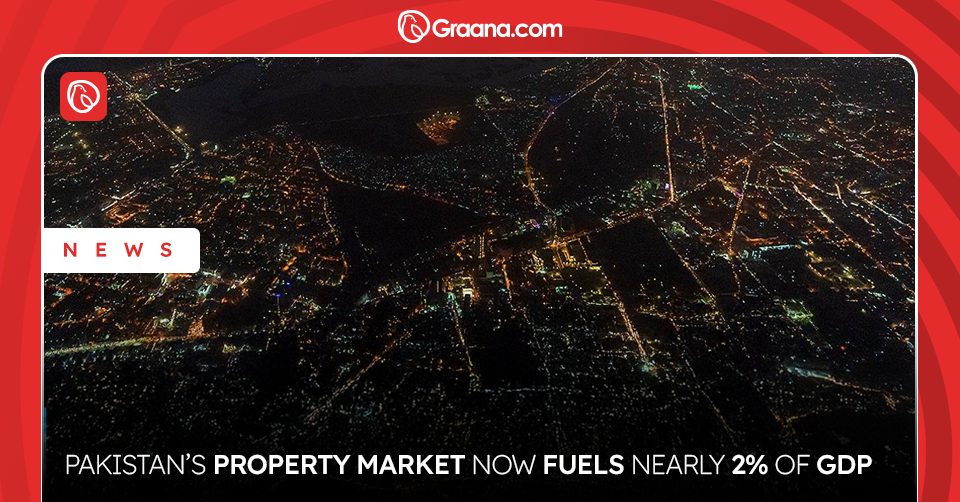
Source: Graana.com
The real estate landscape in Pakistan is on the cusp of a major transformation. As urbanization accelerates, digital technologies reshape traditional practices, and the middle class expands, the sector is poised to undergo significant shifts over the next five years. Historically a cornerstone of the national economy, real estate continues to be a major contributor—accounting for nearly 2% of Pakistan’s GDP—and remains a popular avenue for both residential ownership and commercial investment.
Entering 2025, key metropolitan hubs such as Islamabad, Lahore, Karachi, and Multan are witnessing steady demand across real estate categories. High-rise apartment complexes and gated housing communities have become defining trends—largely driven by young urban dwellers and overseas investors.
Government-backed initiatives like the Naya Pakistan Housing Programme have made strides in expanding access to affordable housing. However, the market still faces hurdles including policy inconsistency and surging construction costs that threaten to slow progress.
Urban Growth & Housing Demand
With the population set to exceed 250 million by 2030, urban centers will see continued pressure on infrastructure and housing. Suburban expansions and new satellite towns will become increasingly common as developers respond to mounting demand.
Digital Disruption
The adoption of digital tools—from property listing platforms to virtual tours and blockchain-based title verification—is redefining how transactions take place. Real estate companies must evolve with these technologies to remain competitive and deliver modern client experiences.
Overseas Investment Surge
Remittance inflows continue to bolster the real estate sector, with a growing number of overseas Pakistanis showing interest in secure and profitable investments back home. This trend will likely amplify in the coming years, driving a more global approach to local real estate marketing.
Regulatory Evolution
Ongoing efforts to digitize land records, implement tax reforms, and improve transparency are reshaping the regulatory landscape. Real estate firms like Kingdom Group that can interpret these changes and guide investors accordingly will play a critical role.
Green Development on the Rise
Climate-conscious construction is beginning to take root. Developers are increasingly integrating sustainability into new projects, responding to both environmental concerns and the expectations of eco-aware buyers.
Residential Real Estate
Expect continued growth in both vertical and horizontal housing schemes. Second-tier cities like Sialkot, Gujranwala, and Faisalabad will attract demand for affordable housing, while vertical living will dominate in urban cores like Lahore and Karachi. Islamabad will likely remain a stronghold for premium gated communities.
Commercial Developments
The growth of startups, freelancers, and e-commerce will increase the demand for coworking spaces, boutique office units, and digital warehousing facilities. Mixed-use developments will also rise as cities evolve into smart urban ecosystems.
Industrial Expansion
CPEC’s Special Economic Zones (SEZs) are expected to energize industrial property investments. Gwadar, Port Qasim, and areas surrounding these economic hubs will likely see heightened interest from both local and international investors.
Tourism & Hospitality Ventures
Tourism-focused real estate—such as vacation homes, resorts, and short-term rental properties—will flourish in scenic northern areas and along the coastline, supported by infrastructure upgrades and a booming domestic travel sector.
Despite its promise, the market is not without risks:
Political instability may hinder policy continuity.
Rising inflation and import costs continue to inflate construction budgets.
A lack of digital infrastructure in rural areas restricts market accessibility.
Heavy reliance on cash transactions reduces transparency and efficiency.
Tackling these obstacles will be crucial to ensuring long-term, sustainable growth.
As the market evolves, the role of experienced, forward-looking real estate firms becomes increasingly vital. Companies like Kingdom Group, recognized among Pakistan’s best, offer investors a trusted bridge to the future—leveraging local expertise, digital tools, and transparent practices.
These firms are not only selling properties; they’re educating buyers, guiding overseas investors, and helping the sector transition toward higher standards and smarter solutions.
The decade ahead holds vast opportunity for Pakistan’s real estate industry. With a combination of demographic shifts, technological advancement, and regulatory reform, the market is ripe for innovation and investment. Stakeholders who align themselves with credible partners, stay informed, and embrace transformation will be best positioned to thrive in this dynamic environment.
Dubai’s residential real estate market maintained its upward momentum in November 2025, with the latest…
Saudi Arabia’s Real Estate General Authority (REGA) has announced the launch of a new platform…
Dubai: Tomorrow World Group, a global enterprise with a 20-year presence in the emirate, has…
Islamabad: The Capital Development Authority has begun a citywide rehabilitation and upgrading campaign, starting…
Dubai: The emirate’s real estate sector continued its strong performance in November 2025, posting transactions…
The 19th Real Estate Development Summit Saudi Arabia Luxury Edition ended after two days of…